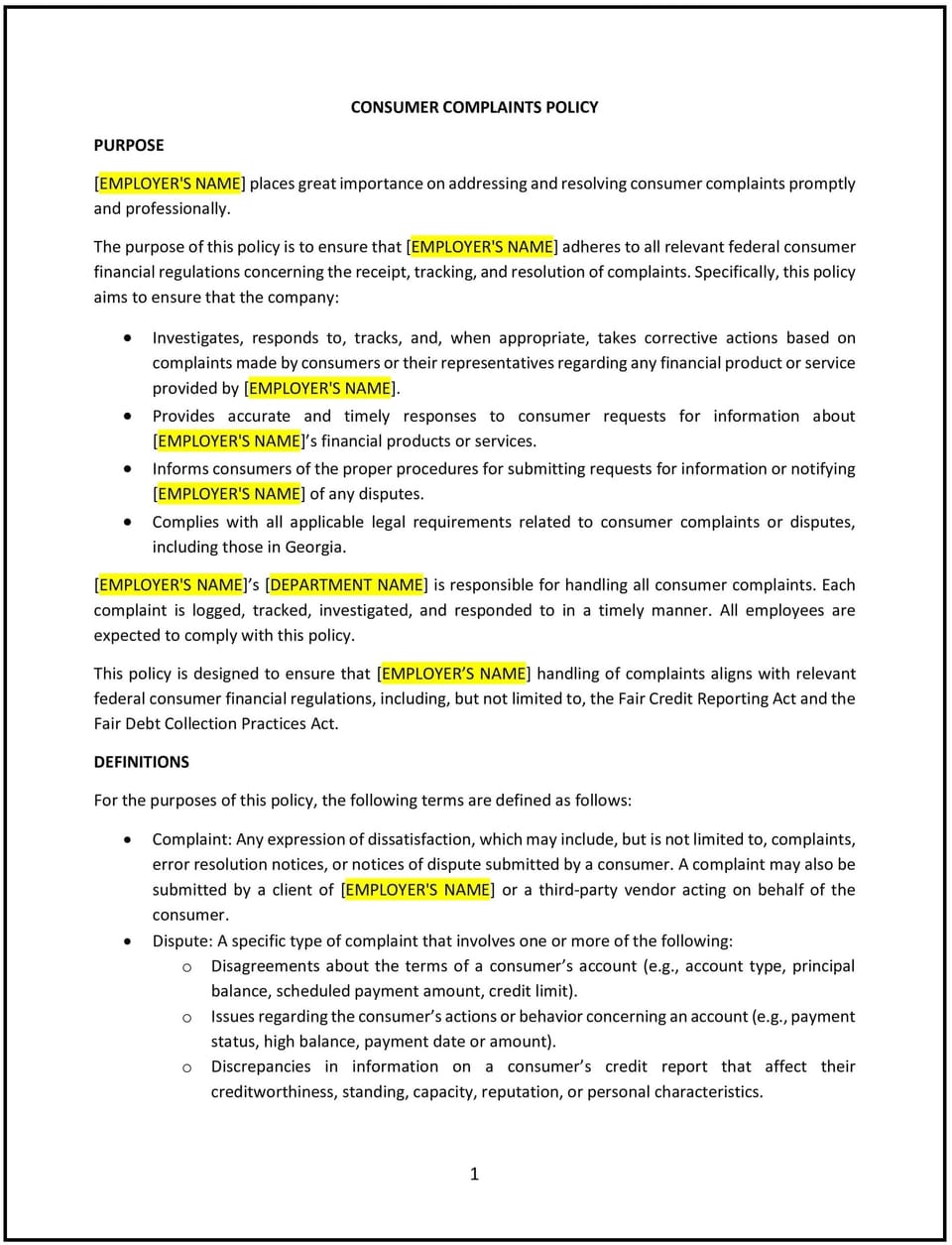Consumer complaints policy (Georgia): Free template

Consumer complaints policy (Georgia)
This consumer complaints policy is designed to help Georgia businesses handle customer complaints effectively and professionally. The policy outlines procedures for receiving, documenting, and resolving complaints to maintain customer satisfaction and improve business operations.
By implementing this policy, businesses can strengthen customer relationships, address issues proactively, and build a reputation for reliability and responsiveness.
How to use this consumer complaints policy (Georgia)
- Establish reporting channels: Provide customers with multiple ways to submit complaints, such as phone, email, online forms, or in-person visits.
- Define complaint categories: Classify complaints into categories (e.g., product quality, service issues, billing disputes) to streamline resolution processes.
- Outline the documentation process: Require employees to document all complaints thoroughly, including customer details, the nature of the complaint, and the steps taken to resolve it.
- Set response timeframes: Establish clear timelines for acknowledging, investigating, and resolving complaints to ensure prompt and consistent handling.
- Assign responsibility: Designate specific employees or teams to handle complaints, ensuring accountability and expertise in resolving issues.
- Provide resolution guidelines: Offer clear steps for resolving complaints, including issuing refunds, replacements, or apologies, depending on the situation.
- Analyze trends: Regularly review complaint data to identify patterns, improve products or services, and address recurring issues.
- Review and update regularly: Periodically review the policy to reflect changes in customer expectations, business practices, or Georgia-specific regulations.
Benefits of using this consumer complaints policy (Georgia)
Implementing this policy provides several advantages for Georgia businesses:
- Enhances customer satisfaction: Prompt and effective resolution of complaints helps maintain positive relationships with customers.
- Builds trust and loyalty: A transparent and professional approach to handling complaints strengthens customer confidence in the business.
- Identifies areas for improvement: Analyzing complaint data highlights opportunities to enhance products, services, or processes.
- Reduces reputational risks: Addressing complaints effectively minimizes the risk of negative publicity or customer dissatisfaction.
- Reflects Georgia-specific values: Tailoring the policy to local customer expectations ensures it is relevant and effective in the state.
Tips for using this consumer complaints policy (Georgia)
- Train employees: Provide training to employees on handling complaints professionally and empathetically to ensure consistent customer experiences.
- Communicate clearly: Ensure customers are aware of how to submit complaints and what to expect during the resolution process.
- Act promptly: Respond to complaints as quickly as possible to demonstrate a commitment to customer satisfaction.
- Monitor outcomes: Track the resolution of complaints to ensure they are handled effectively and meet customer expectations.
- Use feedback constructively: Leverage complaint data to make informed decisions about improving business operations or customer service.
Q: How can customers submit complaints?
A: Businesses should offer multiple channels for submitting complaints, such as phone, email, online forms, or in-person at a designated location.
Q: How quickly should complaints be addressed?
A: Businesses should aim to acknowledge complaints within 24 hours and provide a resolution or update within a specified timeframe, such as five business days.
Q: Who is responsible for handling complaints?
A: Businesses should designate specific employees or teams to handle complaints, ensuring they have the necessary training and authority to resolve issues.
Q: What should be included in complaint documentation?
A: Documentation should include the customer’s contact information, a detailed description of the complaint, any steps taken to resolve it, and the final outcome.
Q: How can complaint data be used to improve the business?
A: Analyzing trends in complaints can help businesses identify recurring issues, improve products or services, and enhance overall customer satisfaction.
Q: What should businesses do if a complaint cannot be resolved immediately?
A: Businesses should communicate the delay to the customer, explain the steps being taken, and provide regular updates until the issue is resolved.
Q: How often should this policy be reviewed?
A: The policy should be reviewed annually or whenever there are significant changes in customer needs, business operations, or Georgia regulations.
This article contains general legal information and does not contain legal advice. Cobrief is not a law firm or a substitute for an attorney or law firm. The law is complex and changes often. For legal advice, please ask a lawyer.


